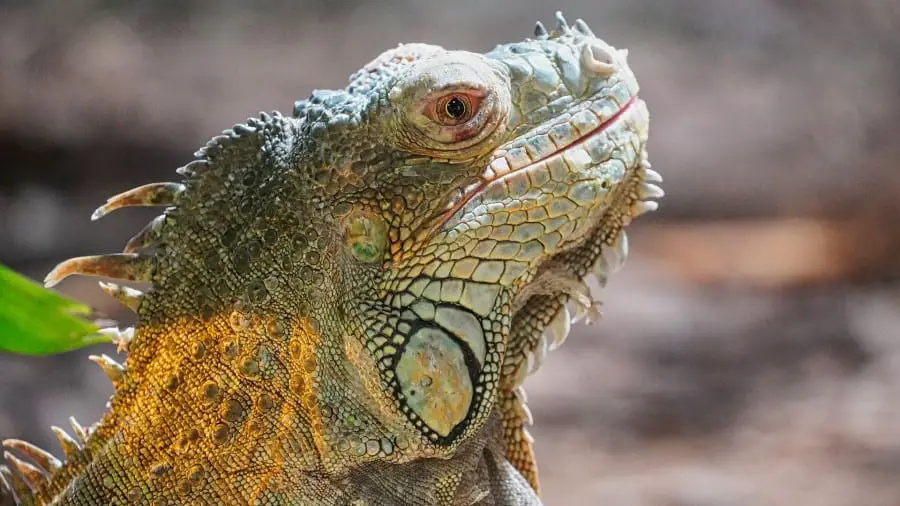
Sometimes, iguanas can act weirdly as if they are blind. Many people with no knowledge about iguanas might think just that. This is not an uncommon question as there are many animals in the wild that are either blind or can’t see very well. I have been researching and owning an iguana for many years now and I have the answer for you.
Iguanas are definitely not blind. They have incredible eyesight that lets them see shapes and colors from far away when it is bright. On top of that, they can also see ultraviolet wavelengths! However, their seeing ability drops significantly in low light condition.
Even though iguanas are not usually blind, there are things that can deteriorate their eyesight or even cause them to go blind. If you own a pet iguana, make sure to read on to learn how you can prevent that.
Main Cause of Blindness in Iguanas
There are many reasons why an iguana can go blind. However, the most common reason is because of deficiency in vitamin A. Iguanas are prone to vitamin A deficiency if they are malnourished, not supplemented well, or being fed the wrong foods.
This will be an unlikely occurrence with a responsible caretaker. Wrong foods for iguanas are foods with low nutritional value such as iceberg lettuce, cucumber, and celery. They are composed of mainly water and fiber with little nutritional value.
On the other hand, great foods for iguanas are things that are usually darker in color. These foods include broccoli, collard greens, kale, boy coy, mustard greens, and so on.
Other than blindness, this deficiency can also cause cornea damage, dry eyes, eye clouding, and bad eyesight during the night time. If you spot any of these, your iguana might be lacking vitamin A. You should take care of it right away to prevent the chances of your iguana going blind.
Solution to Vitamin A Deficiency
It is best to prevent rather than to fix this problem as this could really do harm to iguanas. If it already happened, here’s what you should do.
Blend together carrots, calcium, and multivitamin powder and feed it to your iguana. Alternatively, you can also use baby foods carrot sold in the supermarket instead of having to blend fresh carrots.
You may need a syringe. Do not feed it too much at a time and continue doing this for every meal. Another thing you could do is get some eye drops for turtles on Amazon (#ad) and use it on your iguana. Wet q-tips may be needed to clean out the goop.
If the situation does not get better for your iguana in 2 to 3 days, it’s time to take it to the vet.
Spotting A Blind Iguana
It can take some time to find out that your iguana is blind. Here are some signs to look out for to see if your iguana is blind.
Missing Food
Iguanas usually have very good eyesight and would not miss biting the food. If you are feeding your iguana by hand and it misses the food, it could be a sign that it is blind or can’t see very well.
However, do not mistake this with an accidental bite on your hand or finger while trying to bite the food, that is completely normal. When I say miss, I mean completely miss the food and biting nothing at all.
Ignoring Food
Try putting food in front of your iguana and see if it reacts. If an iguana doesn’t react at all, it could mean that it’s blind. This isn’t always the case though, sometimes, an iguana just doesn’t feel like eating. Keep trying a few more times and if your iguana ignores all the food you put in front of it, there is a high chance that it can’t see.
Clumsy
Iguanas are not clumsy animals, they climb and move around very well without falling off. If you start to notice your iguana falling off or being clumsy such as bumping into objects, it is a bad sign.
You should worry less about your iguana falling and more about how it can find its food and water. Iguanas can fall up to 50 feet without hurting itself. So, it is very unlikely that it will hurt itself by falling over.
Scared to Let Go
What I mean by this is that your iguana seems like it does not want to let go of you after you picked it up. When this happens, it could also mean that your iguana is clingy.
In most cases, they will go down when you try to let them go. For this, you will have to assess it yourself. If your iguana usually goes down when you try to let it go and one day it just decided not to, it could be scared because of the lack of vision.
Caring for Blind Iguanas
It can be tough at first when you find out your iguana is blind. The first thing you need to do is to make the iguana’s enclosure as safe as possible without heights.
This will make it easier for your iguana to navigate around and most importantly find food and water with ease. You do not want it to climb up and down for its meal.
Over time, your iguana should be able to adapt and navigate around with ease once it is used to where everything is located.
Another important thing is to try not to move things around the iguana’s enclosure if it is blind. This will require them to relearn where everything is located.
Fun Fact: Iguana’s Third Eye
If you think iguanas only have 2 eyes, you are wrong! They actually have a third eye called a parietal eye or pineal eye. It is located on the top of their skulls and it looks like a white spot.
Spotting the parietal eye can be hard sometimes depending on the color and scale pattern of the iguana.
This eye does not see the same as the other 2 eyes. The parietal eye cannot form images but they can see colors. However, these colors are only limited to blue and green.
This is believed to help them distinguish day from night. There are 3 main functions of Iguana’s parietal eye:
1. Spot predators from up above by detecting changes in brightness.
2. Regulate their sleeping patterns
3. Helps regulate their body temperature.
Even though the parietal eye cannot see nearly as well as the 2 main eyes, it can protect iguanas from predators while they sleep.
Animals that usually prey on iguanas are large birds. This parietal eye can easily detect the changes in the shadows of a predator, which will inform the iguanas of danger and it’s time to escape.
Conclusion
Iguanas are not born blind but if they are taken care of wrongly, they could go blind. There could be many reasons why iguanas can go blind but a lot of times, it is due to vitamin A deficiency.
Make sure to feed your iguana foods rich in nutrients to prevent this from happening. If your iguana does go blind, there are some clear signs you can look out for.
At the end of the day, if you take care of your iguana well, it will most likely not go blind. Do your research and feed your iguana the right foods.


